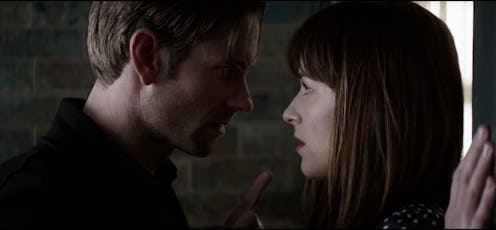Entertainment
This 'Fifty Shades Darker' Subplot Is The Worst
I absolutely love the Fifty Shades series. Both the books and the films (existing and yet-to-be-made) hold a special place in my heart. I can dissect any aspect, any plot detail, any steamy encounter like we're discussing Proust. I could turn you into a Fifty Shades superfan quicker than Christian Grey makes Anastasia Steele... well, you get it. That said, there's one detail I loathe exploring, however much it needs to be explored: why Jack hates Christian in Fifty Shades Darker. Their feud amounts to nothing but alpha male posturing and fragile masculinity gone terribly awry, leaving Ana caught in the middle. Worse still, the point of their feud is, well, pointless.
Narratively, it's not the best look when two guys are fighting because egos are getting bruised and they're trying to romantically reel in the same woman. In fact, it's pretty gross. The feud between Jack and Christian is basically the same in the books as it is in the film; like the film, the book version of their feud seems pathetically baseless. There's no actual physical harm or grievance that Jack and Christian have borne against one another. They are simply flexing their muscles over Ana.
Jack's hatred of Christian the springs mostly from that age-old, primal instinct to be more of a man that Christian. Christian has the thing Jack can't have, which causes Jack to be a jerk about literally everything. In the real world, this competition would die out rather quickly. However, because we need some narrative drive, and it's seemingly easiest to make Ana the object of desire and in constant peril, this baseless feud between Jack and Christian continues throughout Fifty Shades Darker.
In the books, Jack is basically another alpha male full of toxic male behavior that leaves him feeling entitled to Ana's body. It doesn't hurt that she works for him either. He believes he can exert his male privilege in a way that has worked on his previous female employees. As a predatory boss, he doesn't feel he needs Ana's consent to make a pass at her. Jack thinks that his forcefulness will surely make her fall into bed with him. It's so gross and toxic that it shouldn't have ever made it into the books, if I'm being honest.
While it's toned down in the film, in the book version of Fifty Shades Darker, Christian believes that protecting Ana means buying the publishing house she works at, keeping tabs on her boss, and doing things like freezing company assets whenever Ana does something that would remotely push her closer to Jack (like that trip to New York City). The reasons are switched up in the film version, with a bit of control and agency returned to Ana as she decides to not take the trip. But she still has to fight Jack off when he tries to sexually assault her. It's not a good look, no matter what medium you're showing it.
This conflict and harm to Ana's person, both in the film and the book, fuels the fire between Jack and Christian. Their feud — which is one of three sources of conflict seeking to break apart Ana and Christian — is based on the fact that these men recognize the other likes to control, and they have both zoned in on controlling Ana. While Ana has to prove time and time again that she is just fine — and holy hell, let her live and breathe for a minute, guys — these controlling alpha brutes prefer to bash heads until blood (literal and metaphorical) is drawn.
And where is Ana in all of this? Well, she's simply a pawn in their hyper-masculine posturing. Sure, it ends happily ever after for Christian and Ana, but the conflict between these two men was mostly unnecessary in terms of plot. Worse, it only degraded the character development of Christian and Ana. In Fifty Shades of Grey, it appeared that we would get a subversion of expectations by making Ana more of a feminist hero within the BDSM-heavy story, while Christian was softened. That good work seemed to get tarnished in Fifty Shades Darker, especially with the inclusion of Jack's storyline.
Of course, you need a bit of drama on occasion to allow Ana and Christian time to recover from their sex-capades. My only question is: Did it have to be a storyline that was so needless and unnecessarily brutish in its treatment of the film's female protagonist? I could do without it.
